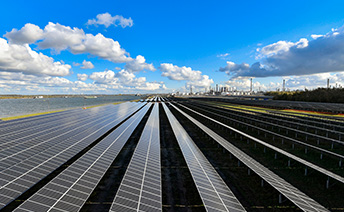Natural Gas Supply Association (NGSA)
NGSA represents integrated and independent companies that supply natural gas.[1] NGSA is the only national trade association that focuses solely on producer-marketer issues related to the downstream natural gas industry in the USA.[2]
Membership of board/executive committee: Shell is a member of the board of directors.
- 2022 assessment outcome: Aligned
- 2021 assessment outcome: Aligned
Summary
Shell benefits from its membership of NGSA, in particular from its expertise in natural gas market and supply issues.
We have found NGSA to be aligned with our climate and energy transition-related policy positions.
We will encourage NGSA to:
- Support improving energy efficiency through standards and regulatory instruments covering key sectors of the economy.
We will remain a member of NGSA. We will continue to engage the association on climate and energy transition topics. We will continue to track alignment between NGSA’s climate and energy transition-related positions and our own.
Further information
Click on the sections below to read more.
- NGSA has stated support for the goals of the Paris Agreement.[3]
- NGSA has stated support for achieving economy-wide net-zero emissions by 2050.[4]
- NGSA has stated support for carbon pricing.[5]
- In comments submitted to the Federal Energy Regulatory Commission in February 2022, NGSA stated “we continue to believe that a well-designed carbon price is the most efficient way to reduce emissions, as it provides the right incentives for everyone – energy producers and consumers alike – to play their part in reducing emissions, including the development of new clean energy technologies. While NGSA has a strong preference for a national economy-wide carbon pricing program, we understand that states are moving forward to meet their clean energy targets.”[6]
No position
- NGSA has stated that “cutting-edge technologies like carbon capture, methane reduction and hydrogen production are key to achieving America’s climate goals.”[7]
No position
- NGSA has stated that “cutting-edge technologies like carbon capture, methane reduction and hydrogen production are key to achieving America’s climate goals.”[8]
- In 2022, NGSA submitted comments in support of the Council on Environmental Quality (CEQ) notice of interim guidance to assist Federal agencies with the regulation and permitting of CCUS activities. NGSA stated that “CEQ’s proposed guidance must bolster the existing rigorous regulatory framework for permitting CCUS projects and facilitate more efficient and timely environmental reviews by Federal agencies.”[9]
No position
No position
- NGSA has stated support for using renewables to generate electricity.[10]
- NGSA has stated support for policies that recognise natural gas as a partner for renewable sources.[11]
- In comments submitted to the Federal Energy Regulatory Commission in February 2022, NGSA stated: “The counter view that natural gas should not be part of the transition and should be replaced as soon as possible fails to recognize its continuing importance for the foreseeable future as a balancing resource needed for reliability, particularly as we increase reliance on intermittent resources.”[12]
- NGSA published its Methane Emissions Principles in 2020, which includes stating that NGSA members support “scientifically sound, cost-effective and flexible methane policies and regulations to allow for efficient implementation, future technology deployment and continuous improvements”.[13]
- NGSA has stated in its Methane Emissions Principles that its members are committed to “reducing methane emissions and making significant investments in processes and technologies to address emissions and reduce flaring”.[14] In a factsheet on ‘Reaching climate goals with gas and LNG’ and profiling member actions in the coming decades, NGSA states that “NGSA members have pledged to eliminate routine flaring, as defined by the World Bank, by 2030.”[15]
No position
No position
No position
No position
No position
[1] https://www.ngsa.org/
[2] https://www.ngsa.org/
[3] https://www.ngsa.org/issues/environment-and-climate/#1597095196217-63ea0564-5781
[4] https://www.ngsa.org/issues/environment-and-climate/#1597095196217-63ea0564-5781
[5] https://www.ngsa.org/issues/environment-and-climate/#1597095196217-63ea0564-5781
[6] https://www.ngsa.org/wp-content/uploads/sites/3/2022/02/NGSA-Post-Technical-Comments-on-Reliability-2-22-22.pdf
[7] https://www.ngsa.org/wp-content/uploads/sites/3/2022/04/04.19.22-NGSA-Statement-on-CEQ-NEPA-Guidance.pdf
[8] https://www.ngsa.org/wp-content/uploads/sites/3/2022/04/04.19.22-NGSA-Statement-on-CEQ-NEPA-Guidance.pdf
[9] https://www.ngsa.org/wp-content/uploads/sites/3/2022/04/NGSA-Comments-on-CEQ-CCUS-Guidance-Docket-CEQ-2022-0001.pdf
[10] https://www.ngsa.org/issues/natural-gas-for-electricity/
[11] https://www.ngsa.org/issues/natural-gas-for-electricity/
[12] https://www.ngsa.org/wp-content/uploads/sites/3/2022/02/NGSA-Post-Technical-Comments-on-Reliability-2-22-22.pdf
[13] https://www.ngsa.org/wp-content/uploads/sites/3/2020/10/10.5.2020-Methane-Principles-Fact-Sheet-FINAL.pdf
[14] https://www.ngsa.org/wp-content/uploads/sites/3/2020/10/10.5.2020-Methane-Principles-Fact-Sheet-FINAL.pdf
[15] https://www.ngsa.org/wp-content/uploads/sites/3/2021/10/Reaching-Climate-Goals-with-Natural-Gas-LNG-Fall-2021.pdf










